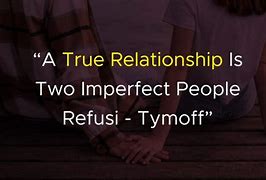a true relationship is two imperfect people refusi – tymoff In today’s world, where relationships often seem disposable, understanding the essence of a true relationship is vital. A true relationship involves two imperfect individuals who choose to stay committed to each other, no matter the challenges. This article delves into the dynamics of such relationships, providing insights into their nature, the factors that influence them, and ways to nurture them.
Types and Categories
Romantic Relationships a true relationship is two imperfect people refusi – tymoff
Romantic relationships are often the first type that comes to mind when we think about true relationships. These involve a deep emotional and physical connection between partners. They are characterized by love, passion, and commitment. a true relationship is two imperfect people refusi – tymoff
Familial Relationships
Familial relationships include bonds with parents, siblings, and extended family. These relationships are foundational to our emotional development and provide a sense of belonging and security. a true relationship is two imperfect people refusi – tymoff
Friendships
Friendships are voluntary relationships that offer companionship, support, and understanding. True friendships endure despite the imperfections and changes in life circumstances. a true relationship is two imperfect people refusi – tymoff
Professional Relationships
Professional relationships, while often overlooked, play a crucial role in our daily lives. These relationships require mutual respect, clear communication, and a shared commitment to goals. a true relationship is two imperfect people refusi – tymoff
Symptoms and Signs
Healthy Relationship Indicators
Healthy relationships are marked by mutual respect, trust, and open communication. Partners in such relationships support each other’s growth and well-being.a true relationship is two imperfect people refusi – tymoff
Unhealthy Relationship Indicators
Unhealthy relationships often feature patterns of control, disrespect, and poor communication. Recognizing these signs early can prevent further emotional harm. a true relationship is two imperfect people refusi – tymoff
Red Flags in Relationships
Red flags include frequent arguments, lack of trust, and emotional or physical abuse. These indicators suggest that a relationship may need intervention or reassessment. a true relationship is two imperfect people refusi – tymoff
Signs of Strong Emotional Connection
A strong emotional connection is evident when partners feel safe to express their true selves, share their vulnerabilities, and support each other unconditionally. a true relationship is two imperfect people refusi – tymoff
Causes and Risk Factors
Biological Factors

Genetic predispositions and hormonal influences can affect how we form and maintain relationships. Understanding these factors can help in addressing relationship challenges.
Psychological Factors
Personality traits, past experiences, and mental health issues significantly impact relationships. Awareness and management of these factors are crucial for relationship health.1
Social and Environmental Factors
Cultural norms, social expectations, and environmental stressors shape our relationships. Recognizing these influences can help in navigating relationship dynamics.
Lifestyle Influences
Lifestyle choices, such as work-life balance, health habits, and recreational activities, play a significant role in relationship satisfaction and longevity.
Diagnosis and Tests
Psychological Assessments
Psychological assessments can help identify underlying issues affecting a relationship. These assessments provide a framework for addressing specific challenges.
Relationship Counseling
Professional counseling offers tools and techniques to improve communication, resolve conflicts, and strengthen bonds.
Self-Reflection Tools
Self-reflection tools, such as journals and personality tests, can help individuals understand their own behavior and its impact on their relationships.
Communication Analysis
Analyzing communication patterns can reveal areas for improvement, such as listening skills, empathy, and clarity in expressing needs and feelings.
Treatment Options
Therapy and Counseling
Therapy provides a safe space for partners to explore their issues, develop healthy coping mechanisms, and rebuild trust.
Conflict Resolution Strategies
Effective conflict resolution strategies include active listening, empathy, and finding mutually acceptable solutions.
Communication Improvement
Improving communication involves practicing honesty, active listening, and constructive feedback. Regular check-ins can also help maintain open lines of communication.
Trust-Building Exercises
Trust-building exercises, such as sharing personal stories and engaging in joint activities, can strengthen the emotional bond between partners.
Preventive Measures
Regular Communication
Consistent and honest communication is the cornerstone of a healthy relationship. Regularly discussing feelings, goals, and concerns helps maintain a strong connection.
Healthy Boundaries
Establishing and respecting boundaries ensures that both partners feel safe and valued. Clear boundaries prevent misunderstandings and promote mutual respect.
Continuous Support
Offering continuous support involves being there for each other in good times and bad. This support fosters a sense of security and belonging.
Mutual Respect and Understanding
Mutual respect and understanding are essential for a lasting relationship. Acknowledging each other’s differences and valuing each other’s perspectives strengthen the relationship.
Personal Stories or Case Studies
Success Stories of Imperfect Relationships
Stories of couples who have navigated challenges and emerged stronger offer valuable insights and inspiration. These stories highlight the importance of perseverance and mutual commitment.
Lessons Learned from Failed Relationships
Examining failed relationships provides lessons on what to avoid and how to improve future relationships. Understanding these failures can lead to personal growth and better relationships.
Inspirational Real-Life Couples
Real-life couples who have maintained their relationships despite imperfections serve as role models. Their stories demonstrate the power of love, resilience, and dedication.
Anonymous Testimonials
Anonymous testimonials offer candid insights into the realities of relationships. These stories provide a diverse perspective on the challenges and rewards of staying committed.
Expert Insights
Quotes from Relationship Therapists
Relationship therapists offer professional insights and advice on maintaining healthy relationships. Their expertise helps in understanding complex relationship dynamics.
Advice from Psychologists
Psychologists provide valuable tips on managing emotions, improving communication, and fostering healthy relationships.
Tips from Relationship Coaches
Relationship coaches offer practical strategies for navigating relationship challenges and enhancing connection.
Research Findings on Relationships
Research findings provide evidence-based insights into the factors that contribute to relationship success and failure.
Conclusion
Summary of Key Points

A true relationship involves two imperfect people who refuse to give up on each other. This journey requires understanding, commitment, and continuous effort. By recognizing the types, symptoms, causes, and treatments, we can build and maintain fulfilling relationships.
Call to Action for Further Education
To further enhance your understanding of relationships, consider seeking professional advice, reading relevant literature, and engaging in self-reflection.



